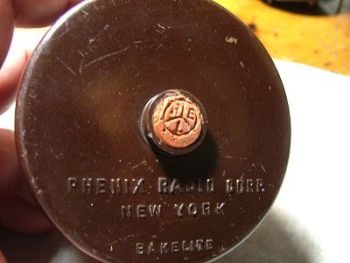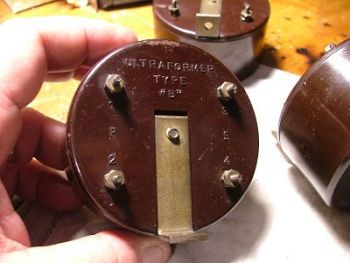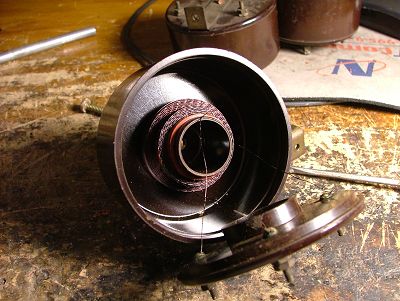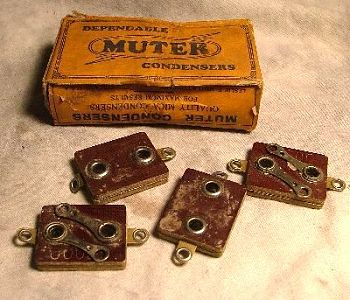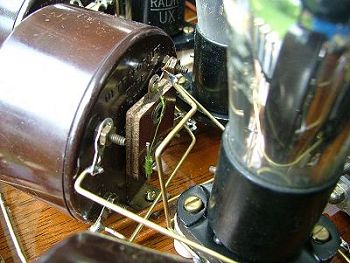The Ultradyne (Phenix) IF transformers
TEST RESULTS
I purchased some of the original Phenix Ultraformers from PTOP and here
are my findings.
I have one Type A and three Type B. The only difference between
the two is that the "A" has lighter coupling, about 1/4" between
primary and secondary while in the "B" the coils are right next to each
other. These transformers are sealed, with the "REL" logo , and I
didn't want to go butchering them up but the "A" that I received had
previously been opened and one of the "B"s had the logo already broken.
There are simply two windings inside. No caps. They are
wound very well and are very solid components compared to the
Victoreens I had mentioned earlier. The connection points on mine
showed a trace of green at the terminals so corrosion COULD be a factor
if a transformer were to measure open. The wire is in the mid-30s
gauge, enamelled. The tolerance between transformers was good.
There was some question before about the actual IF frequency of the
Ultradyne circuit. It appears to be based on 120 kc.
Abt 250 pf will resonate the secondary at that freq and 1000pf will
resonate the primary.
Here are my measurements:
|
Pri L mH
|
Sec L mH
|
Pri R
|
Sec R
|
1(B)
|
1.621
|
6.178
|
7.4
|
15.7
|
2(B)
|
1.595
|
6.192
|
7.1
|
16.0
|
3(B)
|
1.579
|
6.178
|
7.2
|
15.9
|
4(A)
|
1.543
|
6.124
|
7.1
|
16.0
|
Measured
with brass screw in place
Now to tune these as precisely as I did the Victoreens. I also
bought four NOS 250 pf mica caps from Gary. They measure from 207
to 233 pf. Using some in-place secondary measurements I can see
how a guy *could* wind up with these IFs peaking as much as 10 kc
apart even with careful wiring. Matching xfmrs is touched upon in
the old texts but there isn't much said about how to tweak it out in
circuit because they simply didn't have the accurate techniques to do
so. Nowadays we think signal generator and trimmer cap and its
pretty simple.
So what we'll do here is use a similar wire gimmick as we did with the
Victoreens hidden behind the mica caps to match them to the particular
coil. Given the generally low capacitance of the NOS Muter mica
caps I plan
to standardize on 130 kc just for simplicity, the goal is to get them
all within 1 or 2 kcs, something I suspect was luck-of-the-draw back in
1924.
Back to the Ultradyne Project page
15 Jan 2006
